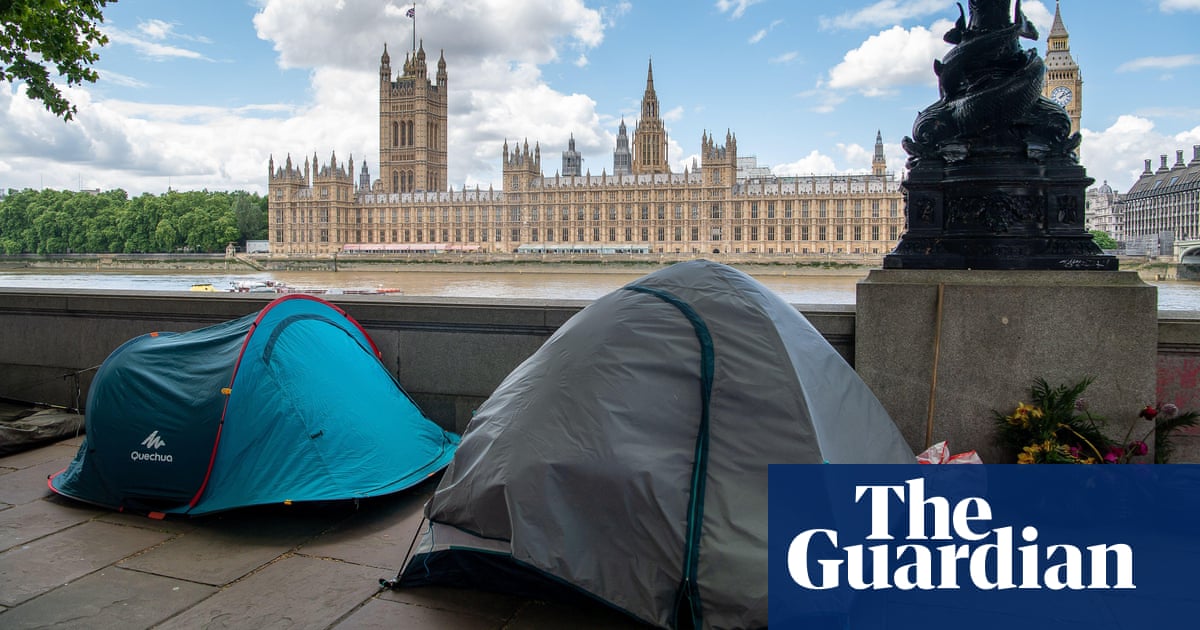
Local authorities will be expected to offer “safe and appropriate” accommodation to thousands of people sleeping rough in England this winter, even where they have restricted eligibility because of immigration status, the government has confirmed.
A ministerial letter sent this week instructs councils to offer accommodation and a Covid vaccination to people currently sleeping rough – and makes it clear this includes those living on the streets who have no recourse to public funds.
The move was welcomed by homeless charity Shelter, which said a number of asylum seekers were refused help by some authorities during lockdown last year because they were supposedly ineligible for homelessness assistance.
Polly Neate, the chief executive of Shelter, said the letter “finally” clarified the law and gave councils a clear mandate to provide accommodation for everyone sleeping rough during the current wave of Omicron infections and cold winter weather. A government programme at the start of the pandemic had been designed to halt rough sleeping while the virus was circulating.
“Despite the ‘Everyone In’ scheme helping thousands off the streets and undoubtedly saving lives at the start of the pandemic, not everyone was helped,” said Neate. “We know from our own services that overstretched councils were, and are, still turning some people away”.
Earlier this year a court ruled in favour of a destitute former asylum seeker, Timon Ncube, who was refused accommodation by Brighton and Hove city council during the pandemic on the grounds that he was not eligible for homelessness help. The court said the council was lawfully able to help him during a public health emergency.
Separately, new data mapping the scale of destitution among migrants during the pandemic has found that thousands of people slipped through the safety net provided by the Everyone In scheme during the first 14 months of the pandemic – often because they distrusted government and were afraid to ask for help.
The data was compiled by the No Accommodation Network (NACCOM) whose 138 frontline member organisations support destitute asylum seekers, refugees and migrants with no recourse to public funds across the UK.
2,771 people approached NACCOM members due to homelessness between April 2020 and June 2021, despite unprecedented levels of emergency statutory provision during Covid-19.
A group of NACCOM community researchers looked at the challenges for homeless migrants during the pandemic. “You are wrestling with need for shelter, but afraid to ask for support as you do not know who you can trust,” they wrote.
The research found charities provided a vital help to people who fell through gaps in government support, including 1,886 with no recourse to public funds, 829 who were refused asylum and 564 with refugee status. Another 493 with no recourse to public funds included migrants from the European Economic Area. NACCOM members provided 413,089 nights of accommodation during this period.
Bridget Young, NACCOM’s director, said: “No one should have to face homelessness and destitution at any time, but for thousands of people to struggle to access safe accommodation during the Covid-19 crisis, when there was emergency support in place, is truly shocking.
“While the government’s emergency support for people experiencing homelessness during Covid-19 was needed and welcomed, our data shows that people still fell through the gaps because of their immigration status, and were put at much greater risk of harm from Covid-19 as a result.”
Ewan Roberts of Asylum Link in Merseyside, which helps homeless asylum seekers and others with accommodation, said some of the people they work with are too frightened to access mainstream support.
“Evictions resumed in September and are continuing despite the rise in Covid infections,” Roberts said. “We had a client ring late yesterday, in a real panic saying he was being evicted: with the Christmas shutdown in place he potentially will be street homeless and outside any mainstream service”.
Lauren Scott, director of Refugees at Home which provides hosts to accommodate homeless asylum seekers, refugees and others, said that she believed the hostile environment was a barrier to people with precarious immigration status seeking support from the government during the pandemic.
“Work needs to be done to build up relationships of trust. But it’s hard to establish these relationships while pushing hostile environment policies.”
A Government spokesperson said: “Councils should exhaust all options within the law to support those unable to access statutory homelessness assistance as a result of their immigration status. As well as working with voluntary partners, this should also include having the power to accommodate rough sleepers in a public emergency – such as if there is a risk to life.
“The Everyone In scheme launched during the pandemic has helped 37,000 vulnerable people, including those not from the UK, and we are providing £2bn over the next three years and £800m this year to tackle rough sleeping and homelessness.”












